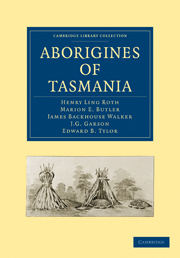Book contents
- Frontmatter
- PREFACE
- Contents
- ILLUSTRATIONS
- CHAP. I INTRODUCTION
- CHAP. II FORM AND SIZE
- CHAP. III PSYCHOLOGY
- CHAP. IV WAR
- CHAP. V FIRE
- CHAP. VI NOMADIC LIFE
- CHAP. VII METHOD OF WEARING HAIR
- CHAP. VIII ASTRONOMY
- CHAP. IX STRING
- CHAP. X TRADE
- CHAP. XI INFANTICIDE
- CHAP. XII LANGUAGE
- CHAP. XIII OSTEOLOGY
- CHAP. XIV ORIGIN
- APPENDICES
- INDEX
- Plate section
CHAP. II - FORM AND SIZE
Published online by Cambridge University Press: 05 December 2011
- Frontmatter
- PREFACE
- Contents
- ILLUSTRATIONS
- CHAP. I INTRODUCTION
- CHAP. II FORM AND SIZE
- CHAP. III PSYCHOLOGY
- CHAP. IV WAR
- CHAP. V FIRE
- CHAP. VI NOMADIC LIFE
- CHAP. VII METHOD OF WEARING HAIR
- CHAP. VIII ASTRONOMY
- CHAP. IX STRING
- CHAP. X TRADE
- CHAP. XI INFANTICIDE
- CHAP. XII LANGUAGE
- CHAP. XIII OSTEOLOGY
- CHAP. XIV ORIGIN
- APPENDICES
- INDEX
- Plate section
Summary
THE very remarkable differences in the descriptions of these people handed down to us by eye-witnesses may perhaps induce the belief that there was ocularly appreciable difference in the physiognomy of the various members of the tribes. This belief finds support in the statement of Kelly (Colonies and Slaves, p. 51), who states that ‘the tribes to the southward and westward are a much finer race of men than those to the eastward and northward.’ It also finds more limited support in an examination of their portraits and photographs. The differences are not very marked, but still they are appreciable. We will now give a detailed description of the face, and follow it up with others of their general physiognomy and other physical characteristics.
The forehead was high, prominent (Laplace, III. ch. xviii. p. 200), narrow and running to a peak (Davies); the malar bones were prominent, and the cheeks hollow (West, p. 77), and the faces massive (Dumoutier, ix. p. 134).
Eyes.– Their eyes were small (Prinsep, p. 79; Marion, p. 28), and hollow (Laplace, p. 200; Prinsep, p. 79; Dumoutier, p. 134). Breton says (p. 349) they were more deeply set than those of any other people, and Milligan (p. 25) that the natives “had projecting eyebrows and sunken orbits,” agreeing herein with Leigh, who describes them as much sunk in the head and covered with thick eyebrows (pp 242–3).
- Type
- Chapter
- Information
- Aborigines of Tasmania , pp. 7 - 22Publisher: Cambridge University PressPrint publication year: 2009First published in: 1890

